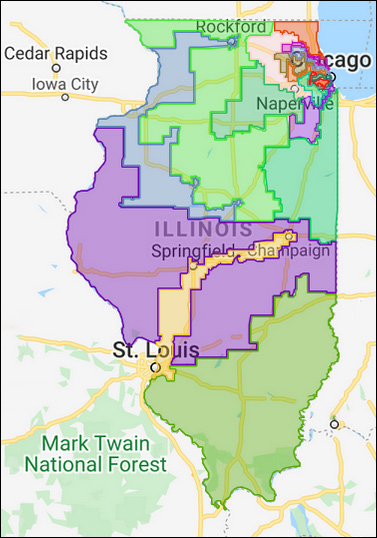
Illinois Congressional redistricting map; to see an interactive map, click here: FiveThirtyEight
March 17, 2022 — Candidate filing in Illinois closed on Monday, and while the post-filing qualification process (most notably insufficient or invalid petition signatures) could disqualify some of those submitting documents, the candidate field for the delayed June 28 primary election is basically set.
Originally, the Illinois primary was scheduled for its typical calendar slot in March, but the legislature decided to delay the primary before redistricting began, incorrectly anticipating that they would have trouble completing the process. Instead, the Illinois Democratic political leadership produced and passed into law arguably the most gerrymandered map in the country.
Though Illinois is a strongly Democratic state, Gov. J.B. Pritzker (D) will seek a second term opposed by a surprisingly large Republican field. The most notable contenders, though none are likely to topple the governor in November, are state Sen. Darren Bailey (R-Louisville), Aurora Mayor Richard Irvin, former state Sen. Paul Schimpf, and venture capitalist Jesse Sullivan.
Sen. Tammy Duckworth (D) is on the ballot for a second term and has drawn a field of eight Republican candidates, with the likely leader being attorney Kathy Salvi, wife of former US Senate nominee Al Salvi, a favorite of conservatives. Sen. Duckworth will be safe for re-election.
While the US House map is designed to produce 14 Democrat victories in the delegation’s 17 seats, adopting the maximum partisan map could make some of the majority party seats weak, thus creating some unexpected competition in the general election.
Incumbents with safe seats are:
- Rep. Robin Kelly (D-Matteson)
- Rep. Jesus “Chuy” Garcia (D-Chicago)
- Rep. Mike Quigley (D-Chicago)
- Rep. Danny Davis (D-Chicago)
- Rep. Raja Krishnamoorthi (D-Schaumburg)
- Rep. Jan Schakowsky (D-Evanston)
- Rep. Brad Schneider (D-Deerfield)
- Rep. Mike Bost (R-Murphysboro)
The lineup features four open seats and two paired incumbent situations. Rep. Bobby Rush (D-Chicago) is retiring after serving 15 terms in the House. The Democrat primary will determine his successor, and the fight is among 20 candidates, including former Chicago Workforce Partnership CEO Karin Norrington-Reaves, who Rep. Rush has endorsed; Jonathan Jackson, son of Rev. Jesse Jackson and brother of former Chicago US Rep. Jesse Jackson, Jr.; and state Sen. Jacqui Collins (D-Chicago).
The new 3rd District is a created open seat — one drawn through redistricting. This seat is 44 percent Hispanic and is designed as the city’s second Hispanic influenced district. The leading candidates for the seat, again to be decided in the Democrat primary, are state Sen. Delia Ramirez (D-Chicago) and Chicago Alderman Gil Villegas.
The new 13th CD is also a created open seat, and one that stretches from Champaign through Decatur then Springfield and all the way into the Illinois side of the St. Louis suburbs. The district is also designed to elect a Democrat, but the general election could become at least somewhat competitive. Former Obama Administration official Nikki Budzinski appears to have the inside track to the party nomination, thus making her the favorite in the general election.
The top Republican is likely Regan Deering, whose family managed the Archer-Daniels-Midland corporation for several decades.
Rep. Cheri Bustos (D-Moline) is retiring and leaves a new 17th District that becomes slightly more Democratic — at D+4 according to the FiveThirtyEight data organization, and is now shaped like a crescent moon that stretches from Rockford through the Quad Cities, Galesburg, Canton, Peoria, and ends in the city of Bloomington. Democrats are fielding four current and former local and state elected officials in addition to three others.
Esther Joy King, the 2020 Republican nominee who held Rep. Bustos to a 52-48 percent win, returns in the open seat and appears a lock for the party nomination. This race will yield a competitive general election.
Back in Chicago, the Democratic pairing features a 6th District race between Reps. Sean Casten (D-Downers Grove) and freshman Marie Newman (D-La Grange). Early polling showed an even split between the two House members. Rep. Newman sees twice as many carryover constituents from her current 3rd District, but her home base of La Grange is not included. She is also under an ethics investigation for allegedly promising a previous opponent a job if he would exit the race.
As a D+6 seat, the Democratic winner is not guaranteed an easy general election ride after the tough primary. Six Republicans are vying for the party nomination including three current and former local elected officials.
Turning to the downstate, the Republican pairing features veteran Rep. Rodney Davis (R-Taylorville) and freshman Rep. Mary Miller (R-Oakland). Davis has the financial advantage, but more of Miller’s constituents carry over. As an R+42 District, the pairing winner gets a safe seat for as long as this map withstands the legal challenges.
Rep. Bill Foster (D-Naperville) sees his 11th District drop from a D+22 to a D+11 rating. This seat should continue to elect a Democrat, but it will be substantially more competitive. Nine Republicans are fighting for the party nomination, but it is not yet clear if the eventual primary winner will be able to put the general election in doubt.
Rep. Lauren Underwood (D-Naperville) held a Republican-leaning seat for two terms but now gets one that favors the Democrats. Her new district is rated D+7, which still means competition, but on a more tilted political field in the congresswoman’s direction. Six Republicans are on the ballot including a current and former local elected official and a radio talk show host.
Rep. Darin LaHood (R-Peoria) will have a new safe Republican 16th District at R+26, but it does not include the LaHood family’s traditional political base in the city of Peoria. His new district will stretch from the Peoria suburbs all the way to Wisconsin and contains only 36 percent of his current 18th District. Still, with only minor Republican opponents and no filed Democrats, Rep. LaHood is assured of re-election.
